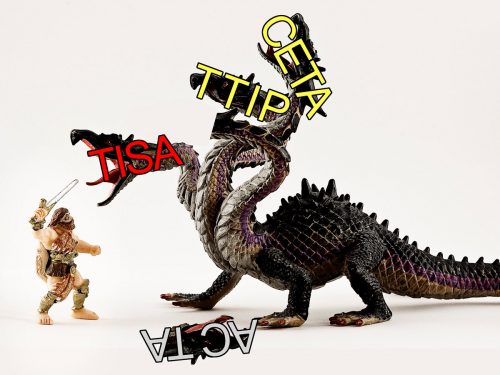Many of you have probably heard of the TTIP – the Transatlantic Trade and Investment Partnership – the massive trade deal currently being negotiated between the U.S. and the EU. We’ve detailed the threats this agreement could pose to digital rights here. But are you familiar with its big brother, TiSA?
Thanks to a leaked document from our friends at Netzpolitik and the Associated Whistleblowers Press, we just learned a whole lot more about it.
TiSA, or the Trade in Services Agreement, is a trade accord currently being negotiated by 23 member countries of the World Trade Organisation (WTO), including the EU, the U.S., Japan, Costa Rica, and Israel. TiSA aims to further open these markets up for trade in services, such as e-commerce, cross-border data flows, and technology transfer. The negotiations of this agreement were launched in 2013 and are taking place behind closed doors. They are not subject to public to the same pressure for transparency, as other infamous trade agreements have been in the past, including ACTA, the current TPP, and the TTIP. However, this trade deal could have a similar, if not bigger, impact on digital rights and particularly the rights to privacy, data protection and freedom of expression.
1. Privacy and data protection
The leaked text would undermine any data protection legislation in place in TiSA countries, including the pending EU Data Protection Regulation. Specifically, the text states:
“No Party may prevent a service supplier of another Party from transferring, accessing, processing or storing information, including personal information, within or outside the Party’s territory, where such activity is carried out in connection with the conduct of the service supplier’s business.”
While this provision could be used to prevent data localization laws, which harm users and threaten the open internet, the language is so sweeping that it could also stop states from passing laws to protect user privacy. Countries with strong data protection regimes, for example, would not be able to implement their own rules, which are designed to ensure a high standard for the protection of personal data within and outside their territories.
2. National security
The leaked text includes an exception for national security that would enable countries to take any measures in “its own essential security interests,” putting security above governments’ duty to protect fundamental rights. A similar proposal appears to exist in the TPP. Such provision could enable countries to police the internet and censor content without due process “for security reasons.” Consider, for example, that as a TiSA member, Turkey could justify its recent legislation facilitating online censorship under this dangerous provision:
“Nothing in [Articles X.1 – X.6] shall be construed to prevent any Party from taking any action which it considers necessary for the protection of its own essential security interests.”
Rules made in the name of “national security” often have a chilling effect on the rights to privacy and data protection, as the Council of Europe has noted in its report on the rule of law on the internet.
3. Net neutrality
The leaked U.S. proposal puts online freedom of expression at risk and could undermine the efforts of TiSA countries to adopt strong and comprehensive rules on net neutrality, including in the EU where the European Parliament has adopted a clear and binding definition this principles in the proposed Telecoms Single Market. But this U.S. proposal also falls short of calls by civil society groups in the U.S., including Access, urging the Federal Communications Commission to reclassify broadband as common carriers and adopt strong rules protecting net neutrality. More surprisingly, yesterday’s leaked proposal even contradicts U.S. President Obama’s recent call for “real net neutrality”.
The leaked proposed text does not guarantee users complete access to the internet but only to “the services and applications of their choice”–which could be interpreted to authorise so-called “zero-rated” services and other forms of price discrimination. Furthermore, text referring to internet providers and “reasonable network management” needs be more clearly defined, as it could enable ISPs to intervene in the network for any reason, including to prioritize specific services or block online content:
“Each Party recognizes that consumers in its territory, subject to applicable laws, and regulations, should be able to:
(a) access and use services and applications of their choice available on the Internet, subject to reasonable network management;”
The measures contained in the leaked proposal contradict national and regional legislation that upholds human rights online. We suspect this text may follow a template of sorts that is being advanced by the U.S. government as European Commission officials confirmed to Access that an almost identical text was put forward by the Obama Administration in the negotiations over TTIP.
The European Commission leads the trade negotiations for the EU and has affirmed time and time again that data protection will not be discussed in the TTIP. This is reaffirmed in the TTIP negotiating mandate while the TiSA negotiating mandate is yet to be made public. However, both yesterday’s leaked document and the EU Commission’s official report shows that negotiations on “rules on cross-border data flow” and “online consumer protection” impacting data protection are in fact taking place.
Access strongly believes that trade agreements are not the fora to establish human rights standards and reaffirms the need for the exclusion of provisions impacting the rights to privacy, data protection, and freedom of expression in these agreements.
Yesterday’s leaked document reminds us of the lack of transparency in these trade negotiations, depriving citizens and civil society from scrutinising proposals that put human rights at risk. Some timid first steps have been made to open the TTIP negotiations to the public, but they’re not good enough. Access urges the European Commission, the U.S., and all other TiSA negotiating parties to negotiate these far-reaching agreements in an open, transparent, and inclusive manner that allows for broad stakeholder participation.
original photo CC BY-NC-ND 2 kakojak
